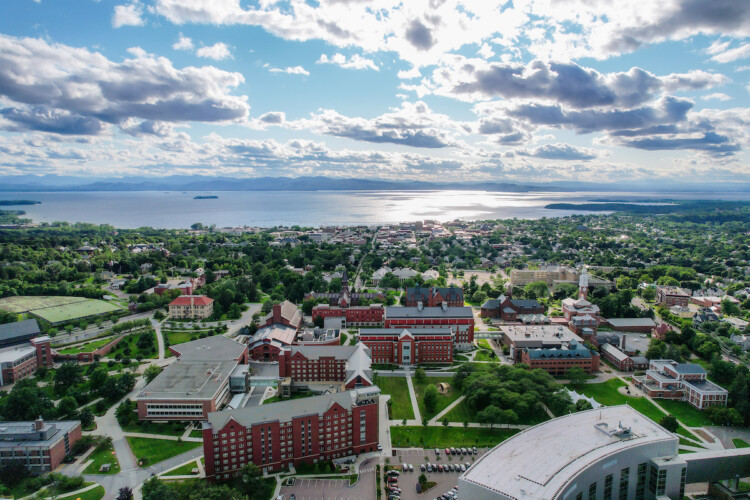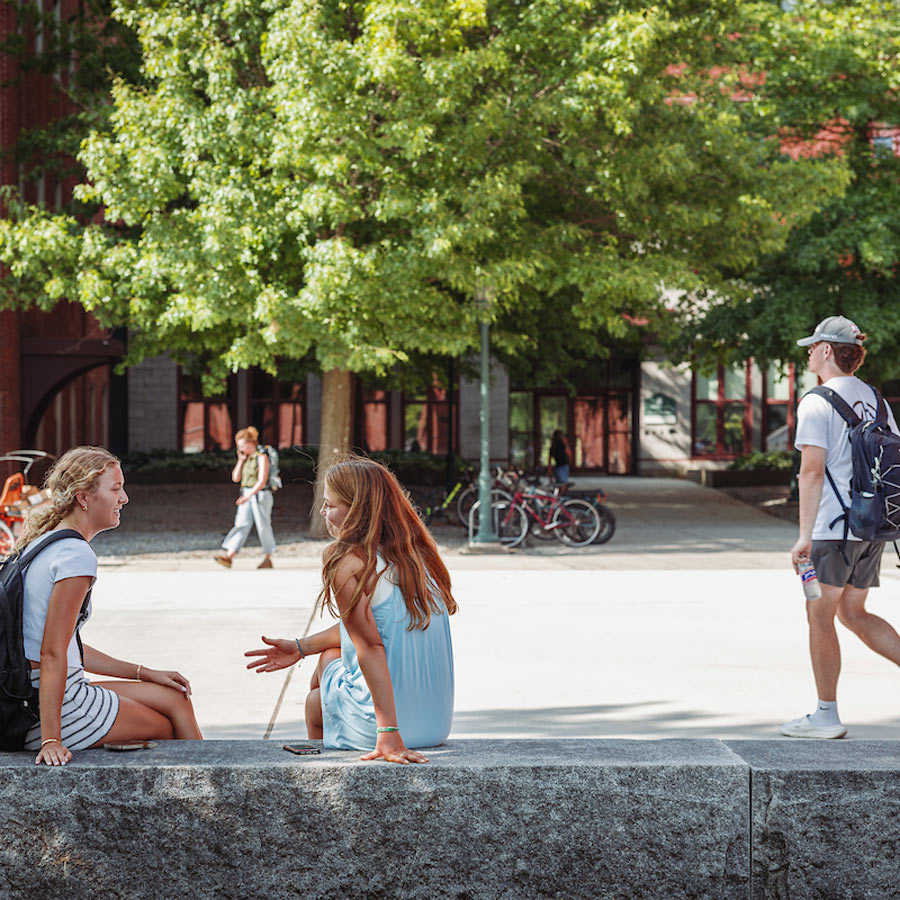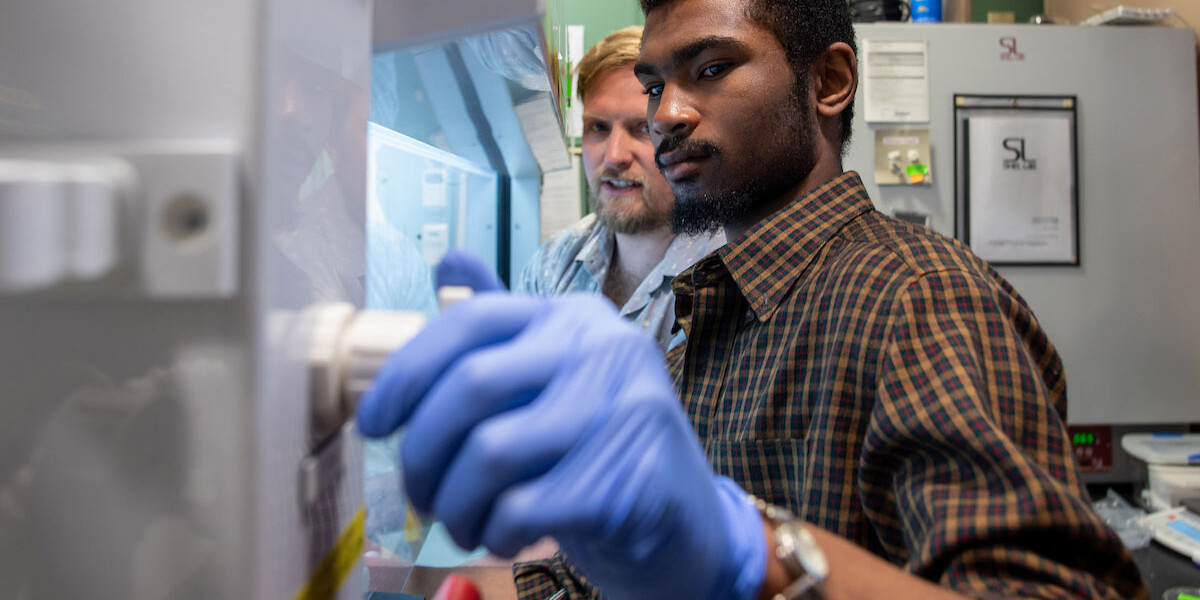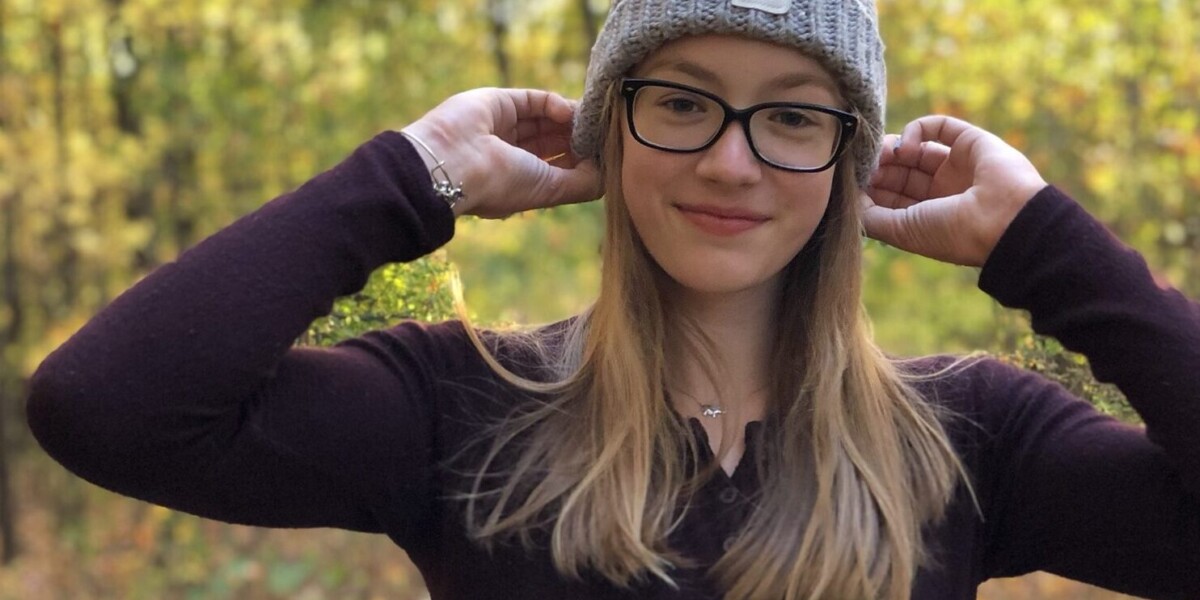Overview
Discover what college is like and earn credits while in high school
The UVM Summer Academy Program is designed to give high school students entering 11th and 12th grade, and recent graduates, a meaningful introduction to college life, academic exploration, and personal growth.
From July 6 – 11, 2026, students immerse themselves in college life, make new friends, explore the theme of People and Planet and enjoy beautiful Burlington, VT through hands-on experiences such as boat tours on Lake Champlain, SIM labs and local adventures.
This program will be open to both commuter and residential students. Both groups will participate in all workshops and activities, both on and off campus, however, the commuter students will not stay in the dorms overnight.
Get a jump start into learning with the on-campus experience and then continue building your skills with a credit online course starting July 13, 2026. Choose from subjects like international relations, human biology, environmental science, business, art, and more, while earning college credit.
There are so many benefits to attending Summer Academy!
- Make your college applications stand out to admissions officers.
- Get a feel for what college will be like, and feel more confident going in.
- Earn credits like you would from an AP class, with courses not typically offered in high school.
- Pay discounted tuition rates or learn tuition-free with Vermont Dual Enrollment vouchers.
- Learn new ideas and perspectives that will help you decide on your major and career path.
“It’s a really good experience…to start getting that mentality that this is going to be what is expected of me and I can do this.”
Ayden Carpenter
Admissions
Who can participate in Summer Academy?
Students are ideal for admission if they are academically motivated, curious about college life, and meet the following criteria:
- Have completed 10th, 11th, or 12th grade
- Are at least 15 years old by the start of the program
- Highly-motivated to be challenged by college-level academics
- Interested in experiencing the University of Vermont
- Want to explore a field of study
Students must register by selecting a course starting July 13, 2026. Courses will be listed soon.
Courses & Format
The UVM Summer Academy is a five-week program that begins with an immersive one-week, on-campus experience, followed by four weeks of online learning through a selection of credit courses. Summer Academy 2026 courses will be posted soon.
- Residential students check in and settle into residence halls on Monday, July 6, marking the start of an immersive week exploring college life and academic themes centered around People and Planet.
- The on-campus portion runs from Monday, July 6, to Saturday, July 11, 2026.
- The online portion begins Monday, July 13, with a selection of credit courses, and all credit coursework concludes by August 9, 2026.
View the Condensed Summer Schedule:
Monday, July 6, 2026: Check in and Orientation
- Orientation
- Campus Tour
- BBQ at Davis/Andrew Harris Commons
Tuesday, July 7, 2026: Environmental System and GIS in Action
- Overview of Planetary Health
- Rubenstein Lab Tour
- Lake Monsters Baseball Game
Wednesday, July 8, 2026: Overview of Engineering and GIS in Action
- Overview of Engineering
- FabLab Tour
- GIS Remote Sensing in Action
Thursday, July 9, 2026: Overview of Innovation and Entrepreneurship and College Skills
- Overview of Innovation and Entrepreneurship
- Student Panel
- Essay Writing and Presentation Skills Concurrent Session
Friday, July 10, 2026: Overview of Health and Medicine and Last Night Close-Out
- Overview of Health, Medicine and Climate Change
- SIM Lab Tour and Health Programs Panel
- Last Night Dinner
Saturday, July 11, 2026: Check-Out
- Breakfast at CCRH
- Students Leave
Summer Academy Workshops & Activities include:
- Admissions Workshop
- Choosing a College Major Workshop
- Campus Tour
- Student Panels and Presentations
- Fabrication Lab (College of Engineering and Mathematical Sciences)
- Clinical SIM Lab (College of Nursing and Health Sciences)
- Fitness Center
- Rubenstein Ecosystem Science Laboratory (Rubenstein School of Environment and Natural Resources)
- Research Vessel Marcelle Melosira Tour
Courses
Whether you’re interested in a taking a course in the medical field, developing new skills in areas like web site development or forensic diagnostics, or simply exploring a class not offered in high school, our Summer Academy courses will help you prepare for your future. If you aren’t seeing the answers to questions you may have here, visit our FAQ for more information.
Environmental Systems and Technology
Engineering and Math
Health and Medicine
Innovation, Entrepreneurship, and Community Development
History and Literature
High school students interested in animal care, veterinary medicine, and local agricultural systems will be challenged to use their high school instruction in real-world animal systems right in our backyards. This course will provide students with the opportunity to integrate classroom instruction, hands-on learning and farm tours to more thoroughly understand how biology, veterinary medicine, animal behavior, and livestock management intersect. Students will have the opportunity to perform physical exams on Holstein cows and calves, and participate in milking and caring for the herd. They will also learn about nutrition, animal handling, vaccines, reproduction programs, animal health management, technology in livestock systems, lameness, calving management, and baby calf care. We will tour several area livestock operations to observe a diverse spectrum of management systems. During the third and fourth weeks, students will work independently on individual projects at home with final presentations on the last day.
Directors/Instructor: Felipe Machado de Sant’Anna, DVM
Course Lab/Materials Fee: TBD
Time: June 30 – July 11, 2025 on campus, 9am – 3:30pm (breaks and lunch)
July 12 – 25, 2025, online
Format: Hybrid
Location: Terrill-Home EC 207, online
Students will learn and apply techniques in biology, genetics, chemistry, and physics while studying how they relate to the forensic investigation of crimes. A wide range of topics will be covered including DNA, entomology, fingerprinting, trace evidence, serology, blood spatter, and chemical analysis of compounds. Students will use case studies, hands on activities and a true crime project to illustrate their learning.
Directors/Instructor: Allison Dean
Course Lab/Materials Fee: TBD
Time: June 30 – July 11, 2025 on campus, 9am – 3:30pm (breaks and lunch)
July 12 – 25, 2025, online
Format: Hybrid
Location: Aiken Center 112 (View Campus Map)
Syllabus: Summer 2025 Syllabus (Downloads as PDF)
This summer course exposes students to the interdisciplinarity of modern science through hands-on learning in labs, interactive lectures, engaged discussions with researchers and medical professionals, and a group project. COMU 1990 provides a comprehensive overview of the different approaches and strategies needed to understand human health from basic research to patient care and treatment.
Directors/Instructor: Delphine Quenet and Stephen Everse
Course Lab/Materials Fee: TBD
Time: June 30 – July 11, 2025 on campus, 9am – 3:30pm (breaks and lunch)
July 12 – 25, 2025, online
Format: Hybrid
Location: Med Ed 100 (View Campus Map)
Sample Syllabus: Please contact the instructor for information about this course.
Health & Medicine Academy
Why take Health & Medicine at UVM?
Medical laboratory science professionals are vital healthcare detectives, competent in the collection, processing and analysis of biological specimens, the performance of lab procedures, the maintenance of instruments, and relating lab findings to common diseases/conditions that assist physicians in patient diagnosis and treatment, as well as in disease monitoring or prevention. This course has been designed to introduce students to the field of Medical Laboratory Science. The course combines lecture and laboratory practice, to allow students to demonstrate professionalism and interpersonal skills while achieving competence with common laboratory procedures. Students will be given the opportunity to demonstrate knowledge in making solutions, using aseptic techniques, and handing laboratory equipment. For the online section of the course, students will be assigned case studies, which will include case history presented, clinical signs and symptoms, initial and additional laboratory testing and data, relevant test methodologies employed and accurate interpretation of results.
The grade in this course will be derived from your efforts in the cumulative final exams for lecture and lab, class participation and presentation, and completion of case study homework.
Instructor: Koela Ray
Course Lab/Material Fee: Lab fee, $50
Time: June 30 – July 11, 2025 on campus, 9am – 3:30pm (breaks and lunch)
July 12 – 25, 2025, online
Format: Hybrid
Location: Patrick Leahy Building 237 (View Campus Map)
Syllabus: TBD
Skills in working with numerical, algebraic, and trigonometric expressions are developed in preparation for MATH 1234: CALCULUS I. Not only will this course prepare course prepare you for calculus; it will also help you ace your SAT! May not be taken for credit concurrently with, or following receipt of, credit for any mathematics course numbered MATH 1234 or above. Prerequisite: Two years of secondary school algebra; one year of secondary school geometry.
Directors/Instructor: Joan Rosebush
Course Lab/Materials Fee:
Time: June 30 – July 11, 2025 on campus, 9am – 3:30pm (breaks and lunch)
July 12 – 25, 2025, online
Format: Votey Building 207, Online
Sample Syllabus: Summer 2025 Syllabus (downloads as PDF)
The central theme of this course is to explore the main research topics guiding our understanding of the different ways in which well-being is conceptualized and pursued in different cultures and societies across the East and West. How we know what we know about well-being differs across cultures, and students will explore these different ways of knowing and its application. Students will engage in in-class activities each week to explore their own well-being based on the readings and lectures.
The human potential to develop an optimal social, physical, and psychological well-being is best understood when we can appreciate the strength of integrating the different perspectives on well-being across cultures and societies.
Looking at defining wellbeing?
While there is no current consensus on a single definition of well-being, researchers agree that well-being is a multidimensional construct involving biological, social, and psychological influences occurring over the course of one’s life. Optimal well-being is a state where one experiences good emotional, physical, and social health. So how do we attain positive states of well-being? Is optimal well-being the absence of suffering?
Positive emotions, absence of negative emotions or cognitions, mastery in chosen field, and satisfying interpersonal relationships provide us the ability to face life’s challenges successfully. However, the pursuit of optimal well-being and the different ways of knowing about aspects of well-being differs across cultures and societies.
Directors/Instructor: Shamila Lekka
Time: June 30 – July 11, 2025 on campus, 9am – 3:30pm (breaks and lunch)
July 12 – 25, 2025, online
Format: Lafayette Hall L111, Online
Syllabus: Summer 2025 Syllabus (Downloads as Word document)
If you aren’t seeing the answers to questions you may have here, visit our FAQ for more information.
Schedule a virtual meeting with a Pre-College Advisor
Book NowStudent Stories
What Students Are Saying
“I’m really glad I took this course. It allowed me to see a glimpse of what college will be like and kept me occupied during the summer. I feel a lot more confident in my academic pursuits, and learned a lot about my own learning style in a very independent environment. I wanted to see what studying neuroscience is actually like before I committed to it.”
Anonymous, Introduction to Neuroscience
“The biggest reason I went to Summer Academy was that I knew college is something I want to do. I wanted to save money, take a college course, and decide whether medical school is possible. After UVM, I’ve found myself interested in neuroscience, neurosurgery, and radiology—any of those related to surgery.”
JeanPaul Habyalimana, Health and Medicine
“It’s a unique experience that you can’t get anywhere else. It really opened my eyes to what a college course would be like and different topics that I wasn’t really aware of before. Originally, when I took the course, I was thinking of going into college as an environmental science and studies major, but it helped me broaden my understanding of these topics. Ultimately, I landed on geography, which is similar in many ways.”
Bayla Steinke, Facing Environmental Futures
“I am so thankful that I had the opportunity to participate in Summer Academy at UVM. By the end of the program, I had met a lovely group of people whom I still keep in contact with, I gained a much clearer understanding of what I want to do, and I feel like I could go to college tomorrow, which I feel puts me ahead of a lot of other students. It was an experience I will absolutely never forget. Now, as a senior, I am applying to UVM as one of my top choices!”
Kate Ciesielski, Health and Medicine
“I would strongly encourage anyone and everyone to attend the UVM Summer Academy if they have a class that meets what they are interested in. It’s a really good experience and I would do it again in a heartbeat.”
Morgan Burnham, Health and Medicine
Instructors and Staff
Instructors and Staff will be announced soon.
“I think it’s always fascinating for high school students to really embed themselves in a college environment…there’s a huge value in being here. For some, the idea of college is a little bit abstract and so demystifying that is really important. This is something students can do and be excited about.”
UVM Professor Tom Wilson
Cost
High school students can immerse themselves in an exciting academic experience in disciplines ranging from engineering to entrepreneurship—all centered around the theme of People and Planet. This unique program offers hands-on learning, interactive projects, and exposure to real-world challenges, giving students a taste of college life. Highlights of the week include engaging workshops, guided activities that explore sustainable solutions, and a chance to collaborate with peers on creative problem-solving. Students choosing the residential option will also enjoy the full dorm experience, build connections and memories while living on the UVM campus.
Week 1: Program Prices – choose a residential or commuter option.
- Residential Fee (live on campus in UVM dorm): $3,000
- Includes housing, meals, and activities
- Commuter Fee: $2,700
- Includes meals and activities
- Deposit: $200 (non-refundable)
- Due upon acceptance
- Tuition: Standard UVM tuition rates apply for the 3-credit course
Weeks 2 – 5: Credit Course Prices
Vermont residents may be eligible to enroll in a credit course tuition-free through the state’s Dual Enrollment Program. Learn more about Vermont Dual Enrollment and apply.
All prices are for Summer 2026.
Credit Course Tuition: Vermont Students (with Dual Enrollment)
- Tuition: $0 (with a Dual Enrollment Voucher)
- Comprehensive Fee: $30
Credit Course Tuition: Vermont Students (without Dual Enrollment)
- Tuition: $346 per credit
- Comprehensive Fee: $30
In-state high school students who do not qualify for the Dual Enrollment program or who have already used their vouchers have the opportunity to enroll in UVM courses, gain college credits, and receive a 50% in-state academic year tuition reduction. Please go to Tuition and Fees and refer to “Rates for Pre-College Programs: High School Student Reduced Tuition Program” and “**Part-Time Student Fees
Credit Course Tuition: Out-of-State Students
- Tuition: $930 per credit
- Comprehensive Fee: $30
This program offers out-of-state high school students the opportunity to enroll in UVM courses, gain college credits, and receive a 50% out-of-state academic year tuition reduction. Please go to Tuition and Fees and refer to “Rates for Pre-College Programs: High School Student Reduced Tuition Program” and “**Part-Time Student Fees.”
Summer Academy Financial Policies
Program Requirements: While doing the UVM Summer Academy program, the participant must be enrolled in a UVM Summer Academy course throughout the duration of the program. If the participant elects to withdraw from their course once it has started, they are required to speak with a Summer Academy Advisor. If the participant does not maintain enrollment in a Summer Academy course, the participant will be required to leave the program without refund.
Tuition: The cost of the tuition is based on a student’s residency status (i.e., in-state or out-of-state) and whether an in-state student uses a Dual Enrollment voucher.
Cancellation & Medical Withdrawal Policy: All cancellation requests must be sent via email at learn@learn.uvm.edu. UVM tuition will be refunded based on the UVM add/drop policy deadlines. You must cancel at least three business days prior to the program start to be refunded the $300 deposit. For a medical withdrawal, the medical condition must be documented by a physician as one that prevents participation in the program.
Please note: The University of Vermont reserves the right to cancel any programs.
For more information and answers to common questions regarding payment, see our FAQ.
Schedule a virtual meeting with a Pre-College Advisor
Book NowDual Enrollment
What is Dual Enrollment?
A statewide program for high school juniors and seniors, to access up to two college courses with tuition fully reimbursed through a voucher system approved by their high schools.
Voucher requests for summer courses open in mid-February, and vouchers for fall courses open in mid-April
A voucher only covers the cost of tuition (up to four credits). Students are responsible for the Comprehensive Fee and, if applicable, specific lab/studio/program fees. Please go to Tuition and Fees and refer to “**Part-Time Student Fees.”
The cost of parking, books, and transportation to/from the University is not included.
- In addition to Summer Academy, many University of Vermont courses are available through this program including International Relations, Computer Science, Human Biology, Environmental Science, and English. Courses are offered during the summer and academic school year, online and on campus.
- Funding is dependent on Vermont Legislative approval.
- For more information, contact our main office: (phone) 802-656-2085 (email) learn@uvm.edu
Who’s Eligible?
High school students who are Vermont state residents are eligible for two vouchers during their junior or senior years in high school. Students are not eligible to use a voucher the summer after they have graduated from high school. Students must apply for a voucher for the semester they wish to enroll in a dual enrollment course and seek approval by their high school. Students who attend an independent high school and whose tuition is not paid for by their hometown are not eligible for a voucher.
Program Detail
- The voucher covers the cost of tuition for up to a four-credit course at any of the participating colleges. The voucher does not cover the comprehensive fee, materials and textbooks. Some funding is available through VSAC to help cover these additional costs, for students who are eligible for free and reduced-price lunch.
- Vouchers are awarded on a semester-by-semester basis, and unused vouchers expire every semester. (You can apply again.)
- Students must apply for a voucher whether they take a course on a college campus, online, or take a course at their high school for college credit.
- Students must get approval for a dual enrollment course from their high school to ensure they will receive high school credit. For a voucher to pay for a college course, it must count as credit towards graduation at the student’s high school.
- If a student changes their mind and wants to attend a different college, the student needs to apply for another voucher.
- If the student drops the course within the college or university’s published add/drop period, the voucher will not be applied, and it is available for use in a different semester.
How to Apply: Step-by-Step Guidance
- Getting started is easy!
- There are two pathways to start the process:
- UVM’s Pre-College website: Submit a Course Application
- Vermont Agency of Education’s website: Apply for a Dual Enrollment Voucher
- Before the Voucher Application Window is OPEN:
- Visit UVM’s Pre-College Website
- Select the Course, and Submit the Course Application
- Establish Contact with UVM Pre-College Advisor
- Visit the Vermont Agency of Education Website when Enrollment Opens
- Submit your Dual Enrollment Voucher Application
- High School Counselor will Review and Approve your Application
- Request your Dual Enrollment Voucher Number from High School Counselor
- Email Voucher Number to UVM Pre-College Advisor
- Visit UVM’s Pre-College Website
- During the OPEN Voucher Application Window:
- Visit the Vermont Agency of Education Website when Enrollment Opens
- Submit your Dual Enrollment Voucher Application
- High School Counselor will Review and Approve your Application
- Request your Dual Enrollment Voucher Number from High School Counselor
- Visit UVM’s Pre-College Website
- Select the Course, and Submit the Course Application
- Include your Voucher Number on your Course Application
- Visit the Vermont Agency of Education Website when Enrollment Opens
- After you submit the Course Application:
- The student’s parent or guardian will receive an email containing a Registration Approval Form.
- This form must be completed and signed to confirm participation.
- If you are pursuing a course that requires pre-requisites for enrollment:
- Your UVM Pre-College advisor will guide you through the process after you submit your application.
- UVM’s Online Registration Team will then manage your enrollment automatically, AFTER you’ve submitted these 3 key documents:
- Dual Enrollment Voucher Application
- UVM Course Application
- Registration Approval Form (Parent/Guardian Signature)
- Students will receive communication after enrollment with next steps for becoming an official UVM Pre-College student –including net ID setup and MyUVM access.
- Pro Tip: Popular courses fill up fast—be sure to stay ahead of the application process to secure your seat!
For more information, please visit the State of Vermont Agency of Education Dual Enrollment Website. Apply for a voucher through the Vermont Agency of Education.
Student Support
Summer Academy Virtual Hub
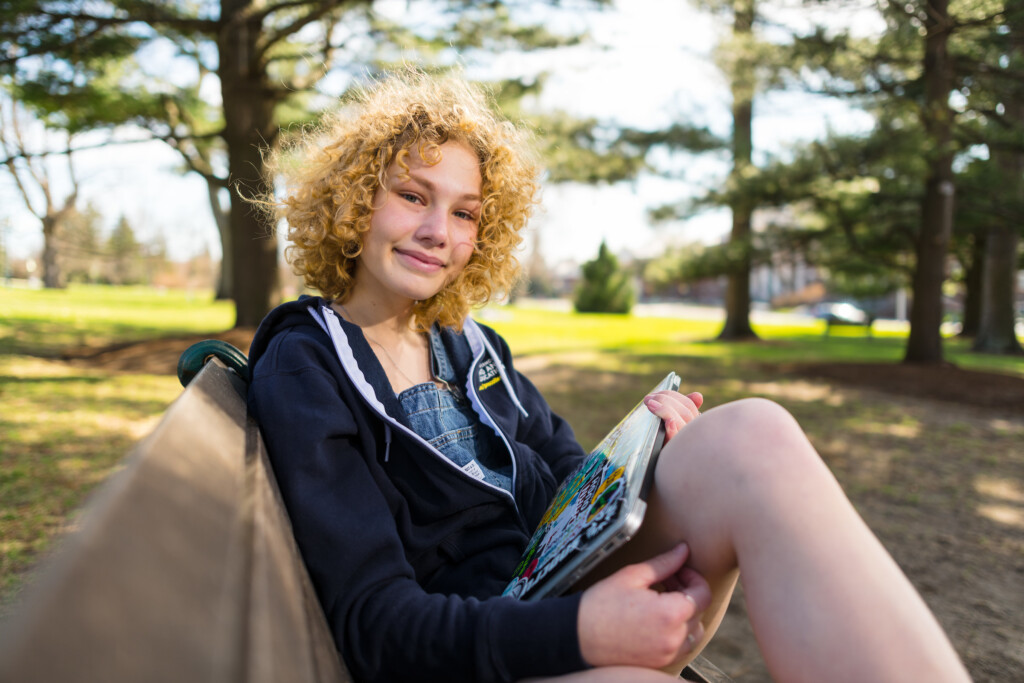
As part of your Summer Academy experience, you will have access to the UVM Summer Academy Student Cohort Hub, designed as a resource to support your UVM courses. As part of the virtual community, you will receive important information about academic updates and deadlines, develop your study and learning skills, and explore the many resources and opportunities provided through UVM and other organizations.
A peek at what is offered through the virtual hub:
- Orientation
- An online introduction to the hub, tech tools, and effective online learning to prepare you for your courses.
- Virtual UVM Tour
- UVM Library Access
- Connection to UVM Resources
- ADA/ACCESS accommodations
- Tutoring Center
- Undergraduate Writing Center
- Center for Health & Well-Being
Advising Support
To maximize your Summer Academy success, UVM’s Pre-College advisor will support you before, during, and after the residential portion of the program through the following structure:
- Pre-Program Orientation: A strong foundation begins before you arrive on campus. The Summer Academy Pre-College Advisor will lead virtual orientation sessions for students and parents, outlining expectations, program goals, and logistics. These sessions will help you and your family prepare for the residential experience and set you up for success during the online academic portion that follows in weeks 2-5.
- Online Office Hours: The Pre-College Advisor will host virtual, drop-in hours during the online credit course to support students academically and personally.
- Mid-Program Check-In: You will be required to meet with the Pre-College Advisor once during the online credit course to discuss any challenges, support needed and connect with resources.
Schedule a virtual meeting with a Pre-College Advisor
Book NowCampus Living

Choosing the residential option means you’ll live and learn alongside fellow Summer Academy students in one of UVM’s newest and most sought-after residence halls. This community environment is designed to deepen your understanding of yourself and help you build meaningful relationships.
Our residential program includes activities planned throughout the day and evening hours, helping you make the most of your pre-college experience. These activities support key cornerstones of UVM’s Residential Life, including:
- Enhancing Learning: workshops on the college admissions process and choosing a major, campus tours of the Rubenstein Ecosystem Science Laboratory, the medical simulation laboratory, and the College of Engineering’s digital fabrication laboratory, plus student panels on time management, and opportunities to hone skills in essay writing and presentation.
- Community Engagement: Games on the Green, BBQ luncheon, and one-of-a-kind opportunity to explore the Melosira research boat on Lake Champlain.
- Health & Wellness: Team-building activities, relaxing time in the dorms, use of the UVM fitness center, a Lake Monsters baseball game, and more.
Residential Housing & Dining
Summer Academy students are housed together and supervised 24/7 by a trained team of Residential Directors and Assistants. The residential program fee includes a dining plan with three meals a day during the on-campus week, ensuring you have convenient and delicious options available. The commuter program fee includes a dining plan for three meals a day during the on-campus week.
FAQ
Yes, online courses starting July 13 will be for college credit.
The only requirement is you have to be a rising junior, senior or recent graduate.
We understand the need for students to drive themselves to campus, especially commuters. For safety reasons, we DO NOT allow students to leave campus with their vehicles for the duration of the program.
The University of Vermont takes the safety of its students very seriously.
On the first day we have both Police Services and the Fire Marshal come to go over fire and safety on campus.
All of our classes are on the UVM campus. The Residential Program Advisors (RA) and the Residential Director will accompany students to any on and off-campus activity. The RA’s go through a full training prior to summer programs.
Our residential program maintains strict staff and RA to student ratios of 1:10 and provides ample training to ensure students remain safe during the program.
Students are strongly encouraged to download and familiarize themselves with the LiveSafe app. UVM’s LiveSafe app is a versatile mobile two-way safety communications platform and safety tool. It provides campus community members the ability to share information with campus safety partners, including calling or messaging Police for emergency help from anywhere. It also contains a “SafeWalk” feature that allows students to select someone to virtually follow them while walking from place to place.
Please review this site for tips and information on how to recognize concerning behavior and to take action if needed. We all serve as the eyes and ears of the university when it comes to safety. If you see something, say something. It is also important to bring concerns, observations, and information directly to UVM Police Services first, so any potential threat can be assessed and necessary action can be taken.
Fire and life safety on the UVM campus:
Please review UVM’s fire and life safety initiatives here. The most important actions we can all take to keep our community safe are to recognize and report all emergencies promptly, to understand and observe the prohibited hazardous items in our residence halls and all buildings in general, and to promptly evacuate buildings when the fire alarm system activates. UVM’s Annual Fire Safety Report for Student Housing contains additional useful information to help prepare you for your stay on campus.
When registering, please provide information regarding any conditions or accommodations you/your child might require for participation in the program. We will send you information on how to connect with Student Accessibility Services.
Monday, July 6, 2026 – Saturday, July 11, 2026 On-Campus
Monday, July 13, 2026 – Friday, August 7, 2026 Online
While participating in the first week of Summer Academy on-campus, all students will attend experiential learning opportunities, workshops, labs and activities followed by a 4-week online credit course.
You will have the same experience as your peers, with the exception of staying overnight in the dorms. With your CatCard (which will be on your phone), you will have access to meals (breakfast, lunch, dinner), Brightspace (SUMA Group Hub), the fitness center, library, and the CCTA buses.
As a high school student, you are enrolled with UVM Professional and Continuing Education as a non-degree student with rights and privileges to UVM resources.
The program fee covers the room (residential students), meals and activities, during the one-week on campus. The cost of the 3-credit course falls under tuition and fees on the Student Financial Services page. Please refer to the Tuition and Fees page if you have questions on academic pricing. The tuition prices listed on our Summer Academy page are broken down by credit and are 50% of the academic year tuition prices. These are the discounts available to high school students.
Financial aid is not available for students participating in this program and there are no scholarships available at this time. Vermont students may qualify for Dual Enrollment vouchers. High school tuition is at a discounted rate.
You will be notified via email to your UVM email address when your bill is available online. For summer courses, you will not receive a bill until mid-May. UVM does not send paper bills. Your bill will indicate your due date – please note that your bill may be due before your classes begin. Bills not paid by the due date are subject to a $250 late fee and a hold on your student record.
Visit www.uvm.edu/~stdfinsv to view all bills and payment due dates. PLEASE NOTE: If someone else will be paying your bill, you have the option to set up a Proxy on your account. To do this, go to the Student Financial Services (SFS) page in your myUVM portal and select “Set Up SFS Proxy Access and Manage Authorizations.”
UVM email is UVM’s official method of contact with students and staff. It is very important that you regularly check your UVM email or forward it to another email account that you check regularly once you are registered. Once you have activated your UVM email, you can read your email via the web at mail.uvm.edu or you can access it in your myUVM portal page. Important messages from UVM, such as class cancellation notices, billing, announcements of special events, and financial aid communications will only be sent via your UVM email address. UVM professors also use email to notify you of any pre-class assignments or requirements. Billing notifications will ONLY be sent to your UVM email. It is extremely important to activate your UVM email as soon as possible and check it regularly.
A typical 3 credit course requires 135 hours of total work. This includes a combination of direct instruction, assignments, discussion boards, and other learning activities. Detailed information about the course structure and expectations can be found in your syllabus.
Yes, laptops are required to participate in UVM courses. Please refer to the course syllabus or email your instructor for exact course requirements. Please be sure you have Microsoft Office or a similar word processing program on your computer so you are able to complete course homework.
Deposit & Confirmation of Attendance
A non-refundable deposit of $200 must be paid to hold a student’s space in the program. Deposits are due when you register. Payment of the deposit represents the student’s confirmation of attendance and is non-refundable.
Payment Deadlines
The Program fee is due by June 1, 2026.
Minimum Enrollment Contingency
Acceptance to Summer Academy Pre-College courses is contingent upon courses reaching a minimum enrollment. If a course to which you have been accepted is cancelled due to under-enrollment, we will offer you a space in an alternate program.
Refund Policy
If UVM Summer Academy cancels the program for any reason, students receive a full refund. If a student withdraws from the program, refunds are provided according to the schedule below. The $200 deposit is non-refundable.
Summer Academy Refund Schedule 2026
Before June 19: 100% minus deposit
After June 19: No refund
Withdrawals must be submitted in writing to: precollege@uvm.edu
Events
Summer Pre-College at UVM Info Sessions
Join us for an informative info session with UVM’s Pre-College Advisor, Aimee Adrian, designed specifically for parents and high school students interested in summer pre-college programs at the University of Vermont.
High School Counselors: UVM Pre-College Info Session
- Webinar
High School Counselors: UVM Pre-College Info Session
- Webinar
Summer 2026 Registration Open
Advising and Student Support
You have the goal; we’ll help you achieve it
We are dedicated to helping you access UVM. It is our role to get to know your experience and goals, assist you in choosing courses, guide you through registration, and serve as your resource throughout your time at UVM.
Curious if your past college credits apply at UVM? Want to understand where a program will take you after completion? Looking for resources for financial aid, tutors, or UVM policies? We’re here to help.
